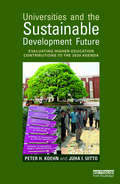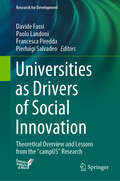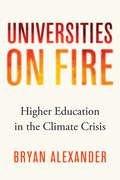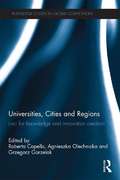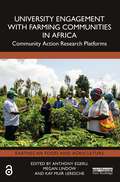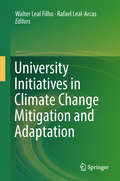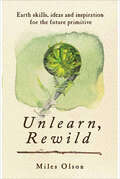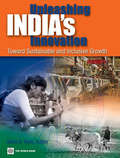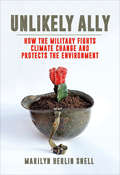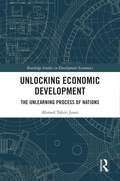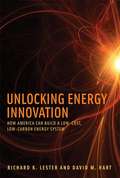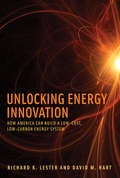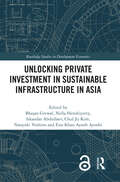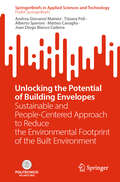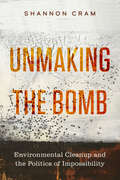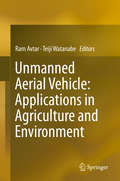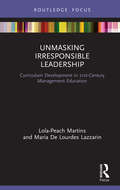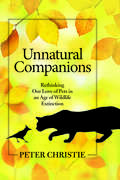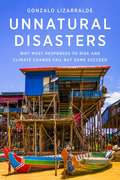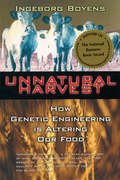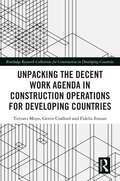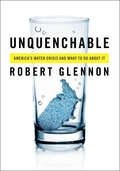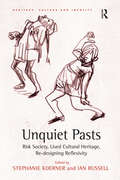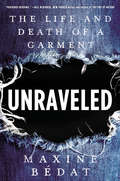- Table View
- List View
Universities and the Sustainable Development Future: Evaluating Higher-Education Contributions to the 2030 Agenda
by Peter H. Koehn Juha I. UittoSince the mid-1970s, a series of international declarations that link environment and sustainable development to all aspects of higher learning have been endorsed and signed by universities around the world. Although university involvement in sustainable-development research and outreach has increased substantially, systematic learning from higher-education engagements has been limited. Universities and the Sustainable Development Future offers institutions of higher learning around the world practical guidelines that can be applied contextually to produce credible evidence regarding the outcome and impact of their teaching, research, and transnational-partnering activities. Drawing on innovative applications of lessons from experience with international-development cooperation, this book demonstrates the utility of a flexible framework that will inspire substantial improvements in the ways universities evaluate and improve their sustainable-development undertakings aimed at promoting Agenda 2030. This book promotes an inclusive evaluation framework that will allow universities to illuminate sustainable-development outcomes, and it provides a cutting-edge resource for students, scholars, and policy makers with an interest in sustainable development, climate change, and evaluation challenges.
Universities as Drivers of Social Innovation: Theoretical Overview and Lessons from the "campUS" Research (Research for Development)
by Davide Fassi Paolo Landoni Francesca Piredda Pierluigi SalvadeoThis book reviews the social role of universities in their local urban contexts and describes a number of initiatives of major interest in terms of the impact achieved, the range of stakeholders involved, and the significance of the university campus and teachers as agents of change. It is divided into three parts, the first of which draws on the international literature to provide theoretical background regarding the role of universities and university campuses as drivers of and magnets for social innovation. The second and third parts each focus on four main themes of interest in the contemporary design setting: urban community gardens, social TV stations, mobile pavilions, and economic sustainability models. After a theoretical overview that also illustrates international best practices, it then focuses on the specific context of Milan, based on the pilot project recently conducted by the Politecnico di Milano, “CampUS - incubation and implementation of social practices”, which won the 25th ADI Compasso d’Oro Award (2018) in the social design category. The book is of interest to academics, students, those working at public institutions, and city policymakers.
Universities on Fire: Higher Education in the Climate Crisis
by Bryan AlexanderScientists agree that we are on the precipice of a global climate crisis. How will it transform colleges and universities?In 2019, intense fires in the San Francisco Bay Area closed universities and drove afflicted people to shelter at other campuses. At the same time, extraordinary fires ravaged eastern Australia. Several universities responded by promising material and research support to damaged businesses while also hosting refugees and emergency response teams in student residence halls. This was an echo of the devastation wreaked by Hurricane Katrina on Tulane University in 2005.In Universities on Fire, futurist Bryan Alexander explores higher education during an age of unfolding climate crisis. Powered by real-world examples and the latest research, Alexander assesses practical responses and strategies by surveying contemporary programs and academic climate research from around the world. He establishes a model of how academic institutions may respond and offers practical pathways forward for higher education. How will the two main purposes of education—teaching and research—change as the world heats up? Alexander positions colleges and universities in the broader social world, from town-gown relationships to connections between how campuses and civilization as a whole respond to this epochal threat.Current studies of climate change trace the likely implications across a range of domains, from agriculture to policy, urban design, technology, culture, and human psychology. However, few books have predicted or studied the effects of the climate crisis on colleges and universities. By connecting climate research to a deep, futures-informed analysis of academia, Universities on Fire explores how climate change will fundamentally reshape higher education.
Universities, Cities and Regions: Loci for Knowledge and Innovation Creation (Routledge Studies in Global Competition #62)
by Roberta Capello Agnieszka Olechnicka Grzegorz GorzelakRegions and cities are the natural loci where knowledge is created, and where it can be easily turned into a commercial product. Regions are territories where, under certain socio-economic conditions, a strong sense of belonging and mutual trust develops the ability to transform information and inventions into innovation and productivity increases, through cooperative or market interaction. Especially in contexts characterised by a plurality of agents — such as cities or industrial districts — knowledge is the result of cooperative learning processes, nourished by spatial proximity, network relations, interaction, creativity and recombination capability. This book explains the logic behind these interactions and cooperative attitudes in regions and cities. One of the most significant channels comes from the presence of a university and its collaboration with firms and scientific research centres. These mutual relations between academic institutions and enterprises are of key importance. The significance of universities in driving economic well being and regional development has been well documented for some time now. Much of the research, however, has centred upon countries in Western Europe and the United States. Increasingly, and since the expansion of the European Union in 2004 in particular, themes of academic entrepreneurship, university-business links, knowledge and innovation have become important on a Europe-wide scale. This book draws together key thinkers from across the continent to analyze the importance of higher educational institutions in fostering development.
University Engagement with Farming Communities in Africa: Community Action Research Platforms (Earthscan Food and Agriculture)
by Anthony EgeruThis book explains and explores how collaborations can be built and strengthened between African universities and farming communities to address real-world contemporary challenges. The book focuses on Community Action Research Platforms, an approach that has successfully enabled African universities to break free of the ivory tower and prove their relevance to society through deep collaborative engagements in targeted agricultural value chains. Developed in a pan-African network of universities (RUFORUM) focused on capacity building in agriculture, the approach has been tested in diverse settings over the last 15 years. The book draws on the experiences and lessons from 21 different projects initiated by RUFORUM member universities in Benin, Botswana, Ethiopia, Ghana, Kenya, Malawi, Namibia, South Africa, Sudan, Tanzania, Uganda and Zimbabwe. It highlights a critical yet underutilised role for African universities as collaborators and catalysts for multisector solutions. These are solutions that increase productivity and address climate change. They develop livelihoods and resilience in rural communities, as well as promote farmers’ access to markets, innovation and trade while safeguarding biodiversity and enhancing food and nutrition security. The book makes a case for repositioning African universities as fulcrums of development in society. It shares the rich experiences, learnings and scientific findings of diverse researchers, practitioners and students who have been working towards achieving this reality on the ground. This multidisciplinary book holds appeal for university leaders, higher education, agrifood and development specialists, researchers and practitioners, policymakers and development agencies engaged in African agriculture and rural development, higher education and sustainable growth.
University Initiatives in Climate Change Mitigation and Adaptation
by Walter Leal Filho Rafael Leal-ArcasThis book focuses on the role of higher education institutions in addressing climate change mitigation and adaptation challenges, contributing to the development of this fast-growing field. Further, it includes the results of empirical research and offers ideas regarding on-going and future research initiatives. The contributions also• showcase the research and projects on issues pertaining to climate change at universities from across the globe;• document and promote ideas and experiences acquired in the execution of research projects, especially successful initiatives and best practices; and• introduce methodological approaches and projects that offer a better understanding of climate change across society and economic sectors.The book is structured around two parts: lessons learned from climate change research, education, studies and projects. Each part focuses on mitigation and adaptation respectively, with many responses of the two modalities overlapping.This book is a valuable resource for researchers and practitioners in the fields of environment, human geography, business and economics, as well as academics and students, as it presents education, communication and awareness-raising projects on matters related to climate change at universities in both industrialised and developing countries, often in cooperation with government bodies, NGOs and other stakeholders.
Unlearn, Rewild: Earth Skills, Ideas and Inspiration for the Future Primitive
by Miles OlsonPicture a world where humans exist, like all other living things, in balance. Where there is no separation between "human" and "wild." Unlearn, Rewild boldly envisions such a world, probing deeply into the cultural constraints on our ability to lead truly sustainable lives and offering real, tangible tools to move toward another way of living, seeing, and thinking.Part philosophical treatise, part hard-core survival guide, this unique and thoroughly unconventional manual blends philosophy with a detailed introduction to a rich assortment of endangered traditional living skills, including:Harvesting and preparing unconventional proteinsFeral food preservationDealing responsibly with wasteNatural methods of birth controlTanning and processing animal skinsLyrical, humorous, surprising, enlightening, and thought-provoking by turns, Unlearn, Rewild is essential reading for those who wish to heal themselves and the earth, live gracefully into the future primitive and experience their wildest dreams.
Unleashing India's Innovation: Toward Sustainable and Inclusive Growth
by Mark DutzIndia's recent growth rate has been impressive, with real GDP rising by over 8 percent a year since 2004. The country is also becoming a top global innovator for high-tech products and services. Still, India is underperforming relative to its innovation potential. Even a dynamic young population--more than half of whom are under 25 years of age--is constrained when skills, training and higher education are insufficient. To sustain competitiveness, economic growth, andrising living standards over the long term, India needs to aggressively harness its innovation potential. The term innovation is broadly defined in this book to include both the creation and commercialization of new knowledge and the diffusion and absorption of existing knowledge in new contexts. A unique feature is the book's focus on inclusive innovation, that is, knowledge creation and absorption activities most relevant to the needs of the poor. Concrete recommendations are made for increasing productivity and welfare through the disciplining role of competition, including training and education, information infrastructure, and public and private finance as support mechanisms for broad-based innovation. 'Unleashing India's Innovation: Toward Sustainable and Inclusive Growth' provides national and local policy makers, private sector enterprises, academic and research institutions, international organizations, and civil society with a better understanding of the power of innovation to fuel economic growth and poverty reduction.
Unlikely Ally: How the Military Fights Climate Change and Protects the Environment
by Marilyn Berlin SnellAn environmental journalist reveals how some California military bases are leading the charge in the fight against climate change. In California, the US military has begun to redefine how our national security operations relate to the destabilizing effects of climate change. Several bases have taken on a largely unrecognized yet crucial role in renewable-energy innovation and in preserving cultural and natural treasures. These facilities are going beyond environmental stewardship to align national defense with energy security and the protection of endangered species. In Unlikely Ally, environmental journalist Marilyn Berlin Snell takes readers through these bases to examine what twenty-first-century sustainable-energy infrastructure looks like; whether combat readiness and species protection can successfully coexist; how cutting-edge technology and water-conservation practices could transform life in a resource-constrained world; and how the Department of Defense's scientific research into the metabolic secrets of the endangered desert tortoise could speed human travel to Mars.
Unlikely Ally: How the Military Fights Climate Change and Protects the Environment
by Marilyn SnellIn a curious incongruity, the planet's dominant fighting machine, the US military, has taken on a largely unrecognized yet crucial role in preserving California's cultural and ecological treasures. Recruits learn to spot murder holes and fire assault rifles amid one of the most biologically diverse regions in the world, and researchers look to the desert's flora and fauna for inspiration. Environmental stewardship is law on installations throughout the United States, but a few bases in Southern California have taken a more comprehensive approach-one in which energy security and protection of natural and cultural resources are embedded in the concept of national defense. With journalist Marilyn Berlin Snell as our guide, we explore a culture informed as much by the natural world as by human ideas of leadership.
Unlocking Economic Development: The Unlearning Process of Nations (Routledge Studies in Development Economics)
by Ahmed Tahiri JoutiDespite the abundant literature about development policies and solutions, many developing countries continue to struggle with basic development issues. The author of this book argues that such a situation is due to the absence of an unlearning process that would aid in adjusting negative mindsets and outdated mental models that hinder economic development.This book addresses development issues from the behavioral perspective, linking negative mindsets and behaviors to growth and development strategies and policies. It identifies six mindsets and actions that impede the economic development of underdeveloped nations. Then, it suggests solutions to upgrade the mindsets according to the plans and policies. Moreover, the book highlights the different concepts and phenomena in a straightforward way with simple figures to facilitate their understanding for people who do not necessarily have a background in business or economics. At the same time, it fully respects scientific standards in addressing the topics and themes under discussion. Each chapter identifies the state of mind needed to ‘unlearn’ with real examples and experiences and offers suggestions to undertake and accomplish the unlearning process.Based on real and clear-cut examples, the book presents the main beliefs and psychological mechanisms that lead to underperforming behaviors of customers, investors, entrepreneurs and policy makers. Thus, the main audience for the book is scholars, students and researchers in economics and development, as well as policymakers, wishing to attempt new approaches to counteract the boomerang effect.
Unlocking Energy Innovation
by Richard K. Lester David M. HartEnergy innovation offers us our best chance to solve the three urgent and interrelated problems of climate change, worldwide insecurity over energy supplies, and rapidly growing energy demand. But if we are to achieve a timely transition to reliable, low-cost, low-carbon energy, the U. S. energy innovation system must be radically overhauled. Unlocking Energy Innovation outlines an up-to-the-minute plan for remaking America's energy innovation system by tapping the country's entrepreneurial strengths and regional diversity in both the public and private spheres. The authors map three waves of energy innovation to show how we can speed up the introduction of new technologies and business models and accelerate their deployment on a massive scale. "Business as usual" will not fill the energy innovation gap. Nor will wishful thinking--common enough today, with politicians and others talking up some technologies, talking down others, and claiming that if we price it, or if we mandate it, or if we simply say it often and inspiringly enough, the innovations will flow. Only the kind of systemic, transformative changes to our energy innovation system described in this provocative book will help us avert the most dire scenarios and achieve a sustainable and secure energy future.
Unlocking Energy Innovation: How America Can Build a Low-Cost, Low-Carbon Energy System
by Richard K. Lester David M. HartExperts outline a plan to overhaul the U.S. energy innovation system for accelerated, large-scale adoption of reliable, low-cost, low-carbon energy technologies.Energy innovation offers us our best chance to solve the three urgent and interrelated problems of climate change, worldwide insecurity over energy supplies, and rapidly growing energy demand. But if we are to achieve a timely transition to reliable, low-cost, low-carbon energy, the U.S. energy innovation system must be radically overhauled. Unlocking Energy Innovation outlines an up-to-the-minute plan for remaking America's energy innovation system by tapping the country's entrepreneurial strengths and regional diversity in both the public and private spheres. “Business as usual” will not fill the energy innovation gap. Only the kind of systemic, transformative changes to our energy innovation system described in this provocative book will help us avert the most dire scenarios and achieve a sustainable and secure energy future.
Unlocking Private Investment in Sustainable Infrastructure in Asia (Routledge Studies in Development Economics)
by Naoyuki Yoshino Iskandar Abdullaev Chul Ju Kim Nella Hendriyetty Bhajan Grewal Ayoob Ayoobi, Eisa KhanInvestment in infrastructure is essential for promoting economic growth, and while countries in Asia have enjoyed higher rates of gross domestic product growth in recent years, the region remains severely deficient in the scale and quality of sustainable infrastructure. Moreover, population growth and climate change continue to put increasing pressure on the need for strategic and farsighted development, calling for policy makers to reevaluate infrastructure governance to ensure sustainable economic growth. Currently, in developing Asia, most investment in infrastructure comes from the public sector. However, with growing fiscal deficits and other budgetary constraints, it is essential to develop alternative sources of investment for infrastructure projects. This presents opportunities to tap into the private sector, which can play an instrumental role in minimizing the funding gap through the development of stronger, more transparent public–private partnerships (PPPs) and incentivizing sustainable infrastructure investment. This book provides a scholarly discussion on the importance of PPPs and approaches to unlock private participation in infrastructure investment based on lessons from across Asia. Among the proposed schemes are government tax incentives, development-based land value capture strategy under PPP land pooling, Viability Gap Funds, Project Development Facilities, and other guarantees. The book aims to assess the impacts and future of sustainable infrastructure investments and examines the role of governments in mobilizing financial resources and new models for unlocking private investment in sustainable infrastructure. This book consists of fifteen original chapters on the experiences of the Central Asia Regional Economic Cooperation (CAREC) and a few other cases for promoting private investment in sustainable infrastructure. The fact that not much has been published previously on this theme makes this book a welcome and timely addition to the much needed knowledge on this subject. ‘The Open Access version of this book, available at www.taylor fran cis.com, has been made available under a Creative Commons Attribution- Non- Commercial- No Derivatives 4.0 license.’
Unlocking the Potential of Building Envelopes: Sustainable and People-Centered Approach to Reduce the Environmental Footprint of the Built Environment (SpringerBriefs in Applied Sciences and Technology)
by Juan Diego Blanco Cadena Andrea Giovanni Mainini Tiziana Poli Alberto Speroni Matteo CavagliàThis book delves into the performance-based design approach, highlighting the necessity for bespoke, adaptive, and cognitive building envelopes that promote sustainable and positive behaviours throughout their lifecycle. A key to unlock the building envelope's potential is the integration of advanced digital tools such as building information modelling (BIM) and digital twin technology, which enable accurate simulation and optimization of energy efficiency, decarbonization, and human-centric design aspects. Moreover, the work emphasizes the importance of a user-centred approach in designing interactive and connected building envelopes, thereby fostering sustainable behaviours among occupants. This focus on user engagement and education in optimizing building envelope utilization not only contributes to reducing the environmental impact but also enhances the quality of life, well-being, and health of occupants. In the era of digital and ecological transition, the book serves as an essential guide to design and operate energy-efficient, responsive, and user-friendly building envelopes, paving the way for a future where the built environment is a significant contributor to sustainability and human health.
Unmaking the Bomb: Environmental Cleanup and the Politics of Impossibility (Critical Environments: Nature, Science, and Politics #14)
by Shannon CramWhat does it mean to reckon with a contaminated world? In Unmaking the Bomb, Shannon Cram considers the complex social politics of this question and the regulatory infrastructures designed to answer it. Blending history, ethnography, and memoir, she investigates remediation efforts at the Hanford Nuclear Reservation, a former weapons complex in Washington State. Home to the majority of the nation's high-level nuclear waste and its largest environmental cleanup, Hanford is tasked with managing toxic materials that will long outlast the United States and its institutional capacities. Cram examines the embodied uncertainties and structural impossibilities integral to that endeavor. In particular, this lyrical book engages in a kind of narrative contamination, toggling back and forth between cleanup's administrative frames and the stories that overspill them. It spends time with the statistical people that inhabit cleanup's metrics and models and the nonstatistical people that live with their effects. And, in the process, it explores the uneven social relations that make toxicity a normative condition.
Unmanned Aerial Vehicle: Applications in Agriculture and Environment
by Teiji Watanabe Ram AvtarThis book showcases how new and emerging technologies like Unmanned Aerial Vehicles (UAVs) are trying to provide solutions to unresolved socio-economic and environmental problems. Unmanned vehicles can be classified into five different types according to their operation. These five types are unmanned ground vehicles, unmanned aerial vehicles, unmanned surface vehicles (operating on the surface of the water), unmanned underwater vehicles, and unmanned spacecraft. Unmanned vehicles can be guided remotely or function as autonomous vehicles. The technology has a wide range of uses including agriculture, industry, transport, communication, surveillance and environment applications. UAVs are widely used in precision agriculture; from monitoring the crops to crop damage assessment. This book explains the different methods in which they are used, providing step-by-step image processing and sample data. It also discusses how smart UAVs will provide unique opportunities for manufacturers to utilise new technological trends to overcome the current challenges of UAV applications. The book will be of great interest to researchers engaged in forest carbon measurement, road patrolling, plantation monitoring, crop yield estimation, crop damage assessment, terrain modelling, fertilizer control, and pest control.
Unmasking Irresponsible Leadership: Curriculum Development in 21st-Century Management Education (The Principles for Responsible Management Education Series)
by Lola-Peach Martins Maria De LazzarinThis book is unique given its scholarly angle in unmasking irresponsible leadership (IL) by focusing on its meaning. For the first time the concept of irresponsible leadership (IL) is explored in depth, the plethora of terms used in various disciplines is synthesised, and the ped-andragogy of teaching IL as a threshold concept of responsible leadership (RL) is discussed. The methodological approach adopted is creative and sound. Following the call for business schools to do more in developing responsible leadership curriculum, the book is the first of its kind devoted to advocating a radical change in the management curriculum. It draws attention to the essence of developing a shared in-depth understanding of IL by addressing the misconceptions of theories and issues that have contributed to the epidemic corporate scandals worldwide. The authors provide a suite of reflective/reflexive tools for RL learning and development, including the first IL definitional framework useful for understanding IL perspectives. In addition the book is the first to introduce the ILRL board game, which increases the learner’s flow state. Thus, the book highlights how various tools can be useful for engagement, and understanding curricula and ped-andragogical issues vis-à-vis corporate leadership practices and sustainability in turbulent times. Our targeted audience: Academic researchers, final year undergraduates, and postgraduate (including Executive MBA) students and Higher Education Curricula developers/designers. The book provides many benefits, some of which include: Pertinent answers to important questions about responsible leadership and curriculum development; sophistication of qualitative research in management studies; in-depth understanding of irresponsible leadership from a cross-disciplinary perspective; support for leadership employability endeavours and equipping students with in-depth understanding of RL; assisting with developing reflective and reflexive practice; and in terms of ped-andragogy, encouraging innovation and creativity in teaching IL as a threshold concept of RL to reduce unnecessary management curricula bias.
Unnatural Companions: Rethinking Our Love of Pets in an Age of Wildlife Extinction
by Peter Christie"Highly compelling...page-turning read" — TNC's Cool Green ScienceWe love our pets. Dogs, cats, birds, reptiles, and other species have become an essential part of more families than ever before—in North America today, pets outnumber people. Pet owners are drawn to their animal companions through an innate desire to connect with other species. But there is a dark side to our domestic connection with animal life: the pet industry is contributing to a global conservation crisis for wildlife—often without the knowledge of pet owners. In Unnatural Companions, journalist Peter Christie issues a call to action for pet owners. If we hope to reverse the alarming trend of wildlife decline, pet owners must acknowledge the pets-versus-conservation dilemma and concede that our well-fed and sheltered cats too often prey on small backyard wildlife and seemingly harmless reptiles released into the wild might be the next destructive invasive species. We want our pets to eat nutritionally healthy food, but how does the designer food we feed them impact the environment? Christie's book is a cautionary tale to responsible pet owners about why we must change the ways we love and care for our pets. It concludes with the positive message that the small changes we make at home can foster better practices within the pet industry that will ultimately benefit our pets' wild brethren.
Unnatural Disasters: Why Most Responses to Risk and Climate Change Fail but Some Succeed
by Gonzalo LizarraldeStorms, floods, fires, tsunamis, earthquakes, tornadoes, and other disasters seem not only more frequent but also closer to home. As the world faces this onslaught, we have placed our faith in “sustainable development,” which promises that we can survive and even thrive in the face of climate change and other risks. Yet while claiming to “go green,” we have instead created new risks, continued to degrade nature, and failed to halt global warming.Unnatural Disasters offers a new perspective on our most pressing environmental and social challenges, revealing the gaps between abstract concepts like sustainability, resilience, and innovation and the real-world experiences of people living at risk. Gonzalo Lizarralde explains how the causes of disasters are not natural but all too human: inequality, segregation, marginalization, colonialism, neoliberalism, racism, and unrestrained capitalism. He tells the stories of Latin American migrants, Haitian earthquake survivors, Canadian climate activists, African slum dwellers, and other people resisting social and environmental injustices around the world. Lizarralde shows that most reconstruction and risk-reduction efforts exacerbate social inequalities. Some responses do produce meaningful changes, but they are rarely the ones powerful leaders have in mind.This book reveals how disasters have become both the causes and consequences of today’s most urgent challenges and proposes achievable solutions to save a planet at risk, emphasizing the power citizens hold to change the current state of affairs.
Unnatural Harvest: How Genetic Engineering is Altering Our Food
by Ingeborg BoyensAdvertisers may want us to believe that our food is produced on picturesque farms, but the cold reality is that the plants and animals we consume may be the result of genetic engineering in the laboratories of multinational corporations.Biotechnology brings with it implications for human and animal health, the threat of environmental damage, a possible redefining of our global food system and a Pandora's box of ethical questions. But the consuming public remains virtually unaware of the genetic alterations of their food and what that may hold in store.Thoroughly researched and accessibly written, Unnatural Harvest holds nothing back in telling us how the food we now serve ourselves and our children may be altered and why we should be very concerned.
Unpacking the Decent Work Agenda in Construction Operations for Developing Countries (Routledge Research Collections for Construction in Developing Countries)
by Fidelis Emuze Tirivavi Moyo Gerrit CraffordLow construction labour productivity and the inadequate welfare of construction workers are consistent challenges in developing countries. These challenges are partially due to shortcomings situated in the Decent Work Agenda. This book proposes ways of sustaining construction labour productivity through fulfilling the Decent Work Agenda. This is a unique area of focus that is essential to fulfilling the broader and global aspects of decent work, sustainability and construction labour productivity. Also, the focus of this book is on contributing to the plight of construction workers whose treatment is significantly unsound. The construction industry needs to develop a humanistic face and contribute to the UN’s sustainable development goal of achieving full and productive employment and decent work for all women and men. To achieve this, construction companies are encouraged to implement corporate social responsibility strategies by equipping workers of different educational levels with knowledge and skills that can be transferred to benefit themselves and their communities. Thus, establishing structured on-the-job training that incorporates sustainability-learning objectives to achieve workers’ safety on sites is essential. The book advocates for decency in the workplace through people-centred management, sustainability learning of skilled and semi-skilled construction workers and decent working conditions. It will be of interest to construction industry policymakers, construction professionals, academics and students of sustainable development and developing economies.
Unquenchable: America's Water Crisis and What To Do About It
by Robert Jerome GlennonIn the middle of the Mojave Desert, Las Vegas casinos use billions of gallons of water for fountains, pirate lagoons, wave machines, and indoor canals. Meanwhile, the town of Orme, Tennessee, must truck in water from Alabama because it has literally run out. Robert Glennon captures the irony--and tragedy--of America's water crisis in a book that is both frightening and wickedly comical. From manufactured snow for tourists in Atlanta to trillions of gallons of water flushed down the toilet each year, Unquenchable reveals the heady extravagances and everyday inefficiencies that are sucking the nation dry. The looming catastrophe remains hidden as government diverts supplies from one area to another to keep water flowing from the tap. But sooner rather than later, the shell game has to end. And when it does, shortages will threaten not only the environment, but every aspect of American life: we face shuttered power plants and jobless workers, decimated fi sheries and contaminated drinking water. We can't engineer our way out of the problem, either with traditional fixes or zany schemes to tow icebergs from Alaska. In fact, new demands for water, particularly the enormous supply needed for ethanol and energy production, will only worsen the crisis. America must make hard choices--and Glennon's answers are fittingly provocative. He proposes market-based solutions that value water as both a commodity and a fundamental human right. One truth runs throughout Unquenchable: only when we recognize water's worth will we begin to conserve it.
Unquiet Pasts: Risk Society, Lived Cultural Heritage, Re-designing Reflexivity (Heritage, Culture and Identity)
by Stephanie KoernerThis important book addresses critical themes in the development of archaeology as a reflexive, self-critical discipline in the modern world. It explores the ethical, political and cultural tensions and responsibilities which need to be addressed by archaeologists when working within networks of global ecologies and communities, examining how authoritarian traditions can exacerbate the divide between expert and public knowledge. Moreover, it analyses how localized acts of archaeology relate to changing conceptions of risk, heritage, culture, identity, and conflict. Bringing insights from Alain Schnapp, Michael Shanks, Isabelle Stengers, Bruno Latour, Ulrich Beck, John Urry and others to cross-disciplinary discussions of these themes, Unquiet Pasts shows how archaeological discourse can contribute towards engaging and understanding current dilemmas. It also shows how archaeology, as a localized and responsibly exercised practice, can play a part in building our commonly shared and experienced world.
Unraveled: The Life and Death of a Garment
by Maxine BedatA groundbreaking chronicle of the birth--and death--of a pair of jeans, that exposes the fractures in our global supply chains, and our relationships to each other, ourselves, and the planetTake a look at your favorite pair of jeans. Maybe you bought them on Amazon or the Gap; maybe the tag says "Made in Bangladesh" or "Made in Sri Lanka." But do you know where they really came from, how many thousands of miles they crossed, or the number of hands who picked, spun, wove, dyed, packaged, shipped, and sold them to get to you? The fashion industry operates with radical opacity, and it's only getting worse to disguise countless environmental and labor abuses. It epitomizes the ravages inherent in the global economy, and all in the name of ensuring that we keep buying more while thinking less about its real cost. In Unraveled, entrepreneur, researcher, and advocate Maxine Bédat follows the life of an American icon--a pair of jeans--to reveal what really happens to give us our clothes. We visit a Texas cotton farm figuring out how to thrive without relying on fertilizers that poison the earth. Inside dyeing and weaving factories in China, where chemicals that are banned in the West slosh on factory floors and drain into waterways used to irrigate local family farms. Sewing floors in Bangladesh and Sri Lanka are crammed with women working for illegally low wages to produce garments as efficiently as machines. Back in America, our jeans get stowed, picked, and shipped out by Amazon warehouse workers pressed to be as quick as the robots primed to replace them. Finally, those jeans we had to have get sent to landfills--or, if they've been "donated," shipped back around the world to Africa, where they're sold for pennies in secondhand markets or buried and burned in mountains of garbage. A sprawling, deeply researched, and provocative tour-de-force, Unraveled is not just the story of a pair of pants, but also the story of our global economy and our role in it. Told with piercing insight and unprecedented reporting, Unraveled challenges us to use our relationship with our jeans--and all that we wear--to reclaim our central role as citizens to refashion a society in which all people can thrive and preserve the planet for generations to come.
